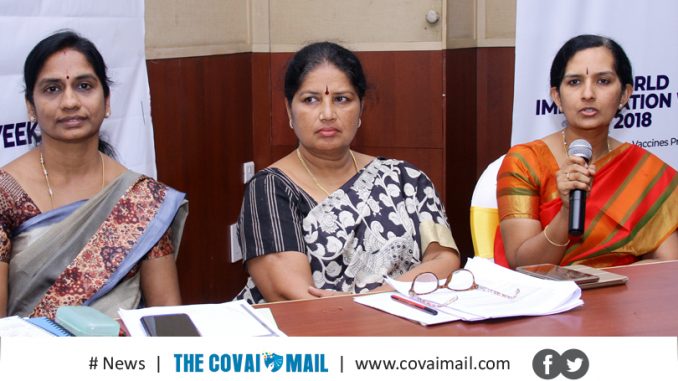
Wider immunization coverage against pneumonia and diarrhea could prevent 1 child death every 6 minutes: Indian Academy of Pediatrics experts

This World Immunization Week, experts share “Vaccines Prevent, Vaccines Protect” message
This year for World Immunization Week (April 24-30) experts from the Indian Academy of Pediatrics (IAP) – Coimbatore came in with full support for national immunization efforts to save the lives of India’s children under five. The country’s goal is to reduce neonatal mortality to at least as low as 12 per 1000 live births and under-5 mortality to at least as low as 25 per 1000 live births by 2030, so that India can meet its Sustainable Development Goals (SDGs).
Pneumonia and diarrhea are the country’s leading killer infectious diseases that claim the most number of lives of children under the age of five. The IAP experts cited data from the International Vaccine Access Center’s (IVAC’s) 2017 Pneumonia and Diarrhea Progress Report, which states that India could prevent over 90,000 child deaths and save over 1 billion USD each year in economic benefits, by scaling up coverage of immunization programs against pneumonia and diarrhea.
Dr. Jeyashree Ashwath, Branch Treasurer, IAP Coimbatore, said, “Immunization is the most powerful tool at our disposal to prevent childhood mortality. Through sustained and intensified vaccination programs, we have successfully rid the world of deadly diseases such as small pox and polio. We must now push for rapid scaling up of efforts to achieve full immunization coverage to reduce the number of young lives lost to vaccine-preventable diseases.”
India’s Universal Immunization Program (UIP) is amongst the world’s largest public health programes that targets 2.7 crore newborns every year with vaccines that are free of cost. It includes vaccines against leading preventable childhood disease such as polio, diphtheria, pertussis (whooping cough), tetanus, tuberculosis, measles, mumps, rubella, hepatitis B, rotavirus diarrhea and pneumonia. In 2014, government launched Mission Indra dhanush, followed by Intensified Mission Indradhanush in 2017 to reach out to all partially vaccinated and un- vaccinated children and pregnant women in select districts and urban cities in India. According to evaluated data from the National Family Health Survey 4 (NFHS-4) in 2014-2015, full immunization coverage was 62% in India and 69.7% in Tamil Nadu. Nonetheless, the current figures are likely higher as a result of the ongoing vaccination programes.
Now the objective is to rapidly build immunization coverage beyond 90% by December 2018. Commenting on the increased focus on immunization, Dr. V. Booma, Professor and HOD of Pediatrics and Nodal Officer, Special Neonatal Care Unit, Medical College and Hospital, Coimbatore, said, “The government’s ongoing efforts to introduce newer vaccines in the UIP will help to prevent leading infections contributing to childhood mortality. I strongly believe that the availability and inclusion of newer vaccines such as the broad coverage pneumococcal conjugate vaccine (PCV) will help India meet the United Nation’s sustainable development goals to reduce under-5 mortality by 2030.”
Also present at the event was Dr. Usha Elango, Central IAP Executive Board Member, Ex-President, IAP, Coimbatore.
According to the World Health Organization, immunization prevents about 2 to 3 million deaths a year and has helped to control several life-threatening diseases and saved millions of lives. Experts from the IAP remain committed to drive more awareness about the role of immunization to reduce childhood mortality in the country.
